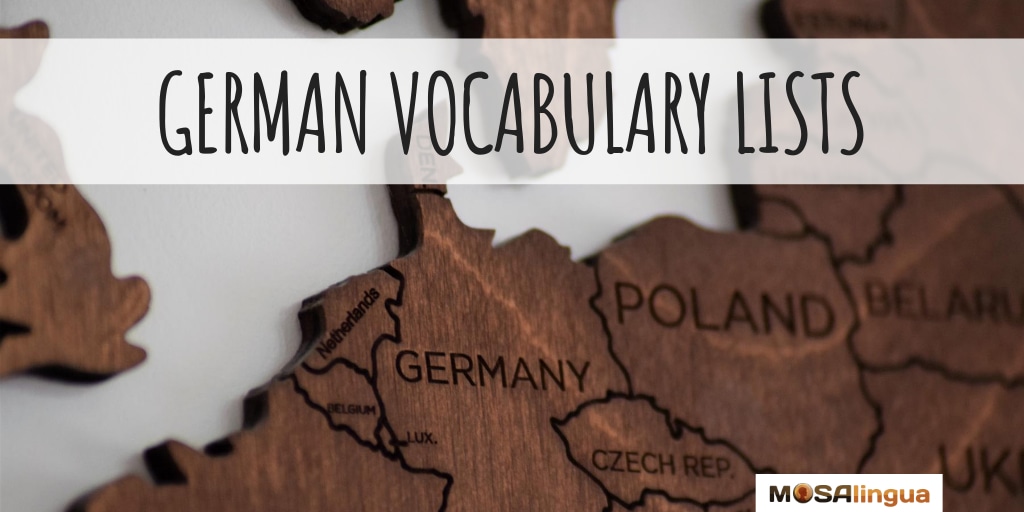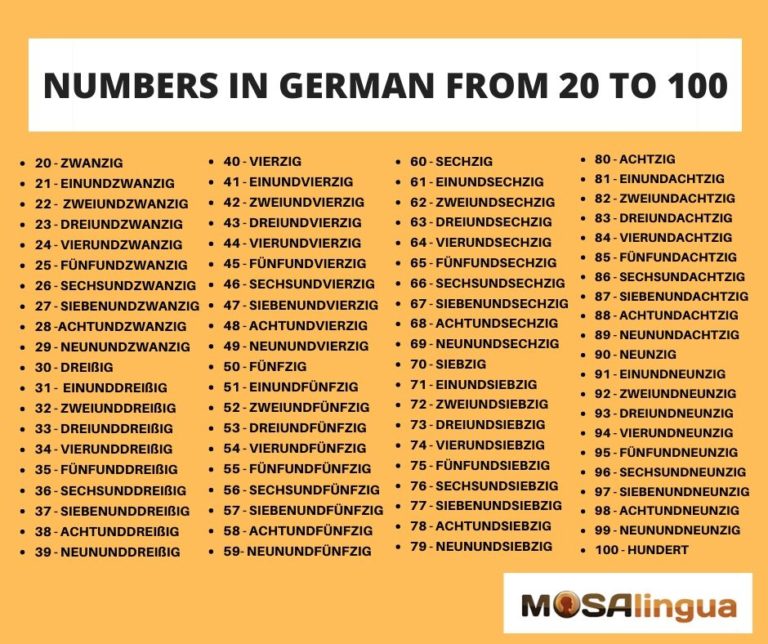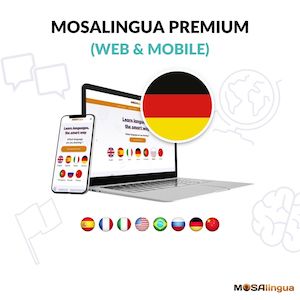We picked out the most common and important German words that every learner should know and put them in one place for you. We broke them down into vocabulary lists and organized them by topic so that you can pick and choose based on your needs. At the end of the article, you’ll find our tips for memorizing German vocabulary and learning German faster.

German Words for Learners: Vocabulary Lists by Topic
When learning German, we think you should focus on the words that you’re most likely to use first. Everyday vocabulary and words related to travel are generally the most useful for beginner learners. If you learn just a few key German words, phrases, and expressions, in just a few days you’ll be able to communicate more easily on your next trip to a German-speaking region or with your conversation partner. To take your vocabulary skills a step further, read our articles about German greetings and German slang. At the end of the article, we’ll tell you how to best expand your vocabulary in any language.
Beginner German Vocabulary: Everyday German Words
Based on frequency lists and common sense, here are some of the first German words you’re likely to need to use.
The basics
- ja / nein = yes / no
- Herr = Mr.
- Frau = Mrs.
- Ich weiß (es) nicht = I don’t know
- Geht klar, (ist) gut, ok = It’s/that’s good / okay
- Ich bin einverstanden = I agree
- Ich bin Amerikaner(in), Engländer(in) = I am American / English
Greetings and polite phrases
- Guten Morgen = Hello
- Wie geht es lhnen? = How are you? (polite)
- Hallo = Hi
- Wie geht es dir? = How are you? (informal)
- Wie gehts? = How’s it going? (informal)
- Bitte = Please
- Sehr gut, danke = Very well, thank you
- Bis bald = See you soon
- Auf Wiedersehen = Goodbye
Start improving your German today
Good news: we can help!
More good news: you can get started for free! With your free trial, you can test drive the most effective method for learning German for the next 15 days!
Vocabulary flashcards, videos with subtitles, audiobooks, articles adapted to your level – with MosaLingua Premium (Web & Mobile), you’ll have access to all this and more. Get started right now. It’s free—and risk-free—to try!
Your first German conversation
- Sprechen Sie Englisch = Do you speak English?
- Ich spreche kein/nicht gut Deutsch = I don’t speak German (very well)
- Ich verstehe nicht = I don’t understand
- Ich lerne Deutsch = I am learning German
- langsamer, bitte = more slowly, please
- Können Sie das bitte wiederholen = Could you repeat that, please?
- Was bedeutet … = What does … mean?
- Was ist das ? = What is that/it?
- Wie spricht man dieses Wort aus? = How do you say this word?
The days of the week
- der Montag = Monday
- der Dienstag = Tuesday
- der Mittwoch = Wednesday
- der Donnerstag = Thursday
- der Freitag = Friday
- der Samstag = Saturday
- der Sonntag = Sunday
And here are a few German words that will help you talk more generally about time…
- der Tag = day
- die Woche = week
- heute = today
- morgen = tomorrow
- gestern = yesterday
German colors, du Farben
A lot of German colors sound very similar to their English translation. Before you look at the translation, read them out loud and see if you can guess which color is which!
- grün = green
- rot = red
- blau = blue
- violett/lila = purple
- orange = orange
- gelb = yellow
- rosa = pink
- weiß = white
- schwarz = black
- grau = gray
- braun = brown
German numbers 1 to 100
Below are just a few of the most common numbers. For a more complete list, as well as lots of ways to use them (telling time, ordered lists, etc.) check out our detailed article on German numbers.
| German Number | Pronunciation | IPA Transcription | German Number | Pronunciation | IPA Transcription |
|---|---|---|---|---|---|
| (1) eins | [ˈains] | (11) elf | [ɛlf] | ||
| (2) zwei | [tsvai] | (12) zwölf | [tsvœlf] | ||
| (3) drei | [drai] | (13) dreizehn | [ˈdraitse:n] | ||
| (4) vier | [fi:ɐ̯] | (14) vierzehn | [ˈfɪrtse:n] | ||
| (5) fünf | [fʏnf] | (15) fünfzehn | [ˈfʏnftse:n] | ||
| (6) sechs | [zɛks] | (16) sechzehn | [ˈzɛçtse:n] | ||
| (7) sieben | [ˈzi:bn̩] | (17) siebzehn | [ˈzi:ptse:n] | ||
| (8) acht | [axt] | (18) achtzehn | [ˈaxtse:n] | ||
| (9) neun | [nɔyn] | (19) neunzehn | [ˈnɔyntse:n] | ||
| (10) zehn | [tse:n] | (20) zwanzig | [ˈtsvantsɪç] |

Intermediate German Vocabulary: German Words for Common Scenarios
Once you have your ABCs and 1, 2, 3s down, learn common vocabulary for scenarios you’re likely to encounter.
At home
- die Küche = kitchen
- das Wohnzimmer = living room
- die Toilette = restroom / WC
- das Schlafzimmer = bedroom
- das Badezimmer = bathroom
- die Garage = garage
- das Büro = office
Eating out
German cuisine tastes even better when you can order it in German! Here are some basic German phrases you’ll need if you go out for some traditional Wurst and Bier. If you have special restrictions or allergies, it might be worth learning more German vocabulary related to food, such as shellfish, peanuts, or dairy.
- Wo gibt es hier ein gutes Restaurant? = Where is there a good restaurant around here?
- Ich würde gerne einen Tisch für zwei Personen um 8 Uhr reservieren = I would like to reserve a table for two for 8 o’clock
- zum hier Essen oder zum Mitnehmen = for here or to go
- die Speisekarte = menu
- das Frühstück = breakfast
- das Glas = glass
- der Teller = plate
- das Mittagessen = lunch
- das Abendbrot, das Abendessen = dinner
- Was würden Sie gern essen? = What would you like to eat?
- Was ist die Spezialität des Hauses? = What is the house special?
- Die Rechnung, bitte = Check, please
- das Trinkgeld = tip
Staying at a hotel
The ultimate goal of many German learners is to have more fulfilling (and less stressful) trips to German-speaking countries like Germany, Switzerland, and Austria. (Not interested in traveling? Check out this list of our top 5 reasons why you should learn German.) If you are learning German primarily for travel, make your hotel stay more pleasant by learning these easy German words and phrases.
- Ich würde gerne ein Zimmer für zwei Personen reservieren = I would like to book a room for two people
- Nur eine Nacht = Just one night
- ein Doppelbett = double bed
- ein Einzelbett = single / twin bed
- der Empfang, die Rezeption = reception
- ein günstiges Hotel = a cheap hotel
- Um wie viel Uhr muss ich auschecken/das Zimmer verlassen? = What time do I have to check out?
- Gibt es einen Parkplatz? = Is there parking?
How Can I Learn (and Remember) New German Words?
Learning German words is only a small part of the battle. Actually remembering the vocabulary you learn is the rest of it! In other words, if you just read through these German vocabulary lists a few times, you might remember a small fraction of the words you see. But a few days from now, that fraction will have shrunk to almost nothing if you don’t actively practice them. Instead of cramming these lists like you would for a high school vocab quiz:
- decide what content is most useful for you based on your learning goals
- choose 10-20 new words to learn each day
- add them to your learning stack in your MosaLingua app, go through the steps to learn them
- and review them regularly, based on the schedule that your app plans for you with its Spaced Repetition System.
This method of reviewing vocabulary right before you’re about to forget it lets you get ahead of the “forgetting curve.” For more info, read about how Spaced Repetition Systems like the one in our app work. Simply put, keep your study sessions short (10-20 minutes) and regular (every day if possible).
The more you come across and use new words, the more likely you are to remember them. In addition to your MosaLingua study sessions, try reading articles, comic books, books, or newspapers in German. Make sure you have access to a great dictionary while you read – click here for a list of our favorite online German-to-English dictionaries.
What’s the best way to broaden my German vocabulary?
The best way to expand your vocabulary in German is to surround yourself with as much of your target language as possible. It’s up to you to create a “German immersion bubble.” This DOESN’T mean you need to travel to a German-speaking country! You can create an immersive environment right at home. For example, try the reading exercises we talk about above. You can also work on identifying the vocabulary you learn when you hear it. Resources like German TV shows, podcasts, YouTube videos, or audio series are helpful for listening comprehension practice.
One more tip: part of learning German vocabulary is learning the right pronunciation. Because what’s the use of learning words if people don’t understand you when you use them? That’s why our apps feature pronunciation by a native speaker for every flashcard. If you want to know how to pronounce words that aren’t in our apps, Forvo German is a great tool. The Google Translate synthetic voice also works in a pinch, though not ideal.
Further Reading About German Words
Are you learning German? These other articles might also be of interest to you:
- An all-in-one method for working on your German speaking skills
- Online German resources to practice any skill you need to work on
- Our full German Grammar Guide that makes learning grammar as painless as possible
- Last but not least, tools to improve your German listening comprehension



![Why You Should Use Flashcards to Learn a Language [VIDEO]](https://www.mosalingua.com/en/files/2018/02/9-300x169.jpg)



Comments